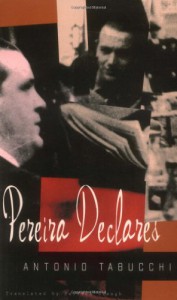The Power of Certain Narratives: "Pereira Declares" by Antonio Tabucchi, Patrick Creagh (translator)

“[…] but I feel I must tell you that originally, we were Lusitanians, and then came the Romans and the Celts, and then came the Arabs, so what sort of race are we Portuguese in a position to celebrate? The Portuguese Race, replied the editor-in-chief, and I am sorry to say Pereira, that I don’t like the tone of your objection, we are Portuguese, we discovered the world, we achieved the greatest feats of navigation the world over, and when we did this, in the 16thcentury, we were already Portuguese, that is what we are and that is what you are to celebrate, Pereira.”
In “Pereira Declares” by Antonio Tabucchi.
I read this in a Portuguese translation from the Italian more than ten years ago, if memory serves me right, I haven't come across anything quite like it and I still have a place in my heart for portly, perspiring Pereira with his omelets and his quiet, but subversive, decency. This time, this wonderful translation by Patrick Creagh just made my day.
In a narrative that does not want a puzzle, Tabucchi uses a very similar resource to the one used by Isaac Bashevis Singer: that of telling alien stories supposedly collected from conversations with real people, and not hiding it in the book's writing. “Pereira Declares” is a book that walks slowly, seeking to situate the scenario through which the characters walk, without extending the descriptions but worried to leave the reader with significant details about the characters, as, for example, the custom of Pereira to take Lemonades and the same path every day.
If you're into European Literature, read on.
 3
3



